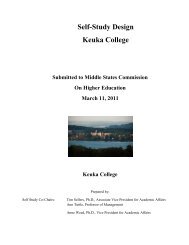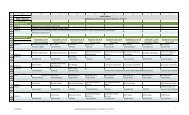final version of the self-study document - Keuka College's Middle ...
final version of the self-study document - Keuka College's Middle ...
final version of the self-study document - Keuka College's Middle ...
You also want an ePaper? Increase the reach of your titles
YUMPU automatically turns print PDFs into web optimized ePapers that Google loves.
Beyond assessment that channels up through <strong>the</strong> divisions, <strong>the</strong> institution takes on<br />
additional assessment in <strong>the</strong> areas <strong>of</strong> general education and institutional goals. The<br />
integration <strong>of</strong> experiential, Program, General Education, and E-LEAP goals as <strong>the</strong>y have<br />
been accomplished in <strong>the</strong> past can be seen in Appendix 4.17 Assessment <strong>of</strong> Student<br />
Learning Plan Diagram. Going forward, this integration will also be tied in with <strong>the</strong><br />
annual reviews by <strong>the</strong> Institutional Effectiveness Committee. The general educational<br />
outcomes are maintained and assessed through efforts <strong>of</strong> <strong>the</strong> Curriculum Committee.<br />
There are sixteen stated general education goals, and <strong>the</strong> committee is currently<br />
reviewing four each year in an on-going four-year process and results are analyzed and<br />
acted upon by <strong>the</strong> committee. The overall institutional goals, <strong>the</strong> Essential Learning<br />
Goals (E-LEAP), are assessed through alignments with programs and divisions and by<br />
institutional assessments overseen by <strong>the</strong> Institutional Effectiveness Committee and<br />
analyzed by Institutional Research and Institutional Assessment. Institutional assessment<br />
such as NSSE and Noel-Levitz are on opposing two-year cycles, while o<strong>the</strong>rs are<br />
beginning a periodic assessment cycle. Results are discussed in <strong>the</strong> Institutional<br />
Effectiveness Committee and next steps for significant results identified.<br />
Annual assessment reports are due ei<strong>the</strong>r on June 15th or September 15, depending on <strong>the</strong><br />
particular program. The Institutional Effectiveness Committee reviews <strong>the</strong> individual<br />
reports after submission and prepares summary reports for <strong>the</strong> start <strong>of</strong> <strong>the</strong> new academic<br />
year or later, depending upon submission date (see above). For June 15th submissions,<br />
<strong>the</strong> timing enables areas to work on recommendations over <strong>the</strong> summer months, and areas<br />
requiring additional resources can be addressed prior to <strong>the</strong> start <strong>of</strong> a new academic term.<br />
This timing is paramount to ensuring that assessment results are available and analyzed<br />
as a critical part <strong>of</strong> <strong>the</strong> planning process for each area or division for <strong>the</strong> coming<br />
academic year. Results <strong>of</strong> institutional assessments, program reviews, and annual<br />
assessment reports will drive <strong>the</strong> work <strong>of</strong> <strong>the</strong> Institutional Effectiveness Committee in <strong>the</strong><br />
coming fall and provide essential information to <strong>the</strong> President’s Cabinet to inform<br />
decision-making, planning, and budgeting.<br />
The newly developing College-wide strategic plan features assessment support and<br />
activities throughout <strong>the</strong> <strong>document</strong>. A major inclusion is support for a College eportfolio<br />
system. The Dean for <strong>the</strong> Center for Experiential Learning and <strong>the</strong> Director <strong>of</strong><br />
Educational Technology have been reviewing multiple companies that provide<br />
assessment-based e-portfolio systems. During <strong>the</strong> 2011-2012 academic year, a number <strong>of</strong><br />
faculty and experiential learning staff have been evaluating Foliotek<br />
(http://www.foliotek.com/). The preliminary results indicate that this will be a beneficial<br />
product moving forward (Appendix 4.55 Pilot Program for Foliotek Eportfolios Spring<br />
2012). This product is particularly attractive because it is based on assessment first. The<br />
faculty have been utilizing more rubrics in <strong>the</strong>ir assessments, and <strong>the</strong>re is interest in using<br />
<strong>the</strong> AAC&U VALUE rubrics to help with Gen Ed and E-LEAP assessments. The<br />
Foliotek system integrates rubrics with <strong>the</strong> <strong>document</strong> repository, and will allow faculty to<br />
directly complete rubric-based assessments.<br />
Lastly, assessment <strong>of</strong> student learning is valued, recognized, and supported through<br />
funding (grants to fund faculty attendance at assessment workshops), awards<br />
Page 30 <strong>of</strong> 31 Chapter 4: Inst. Effectiveness & Assessment




